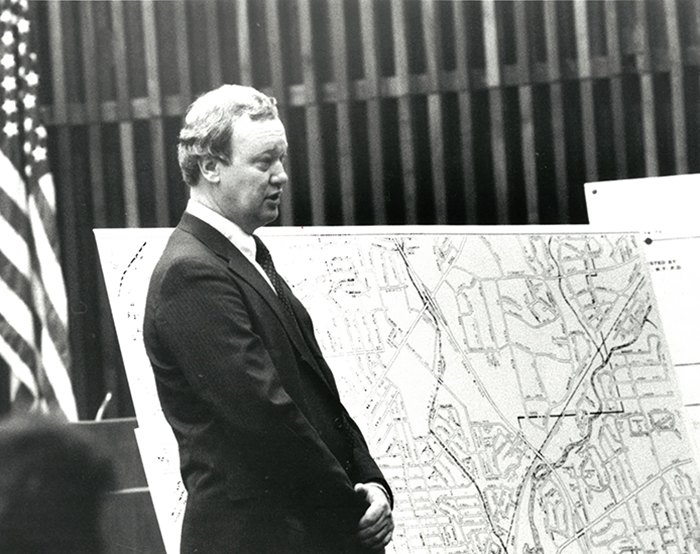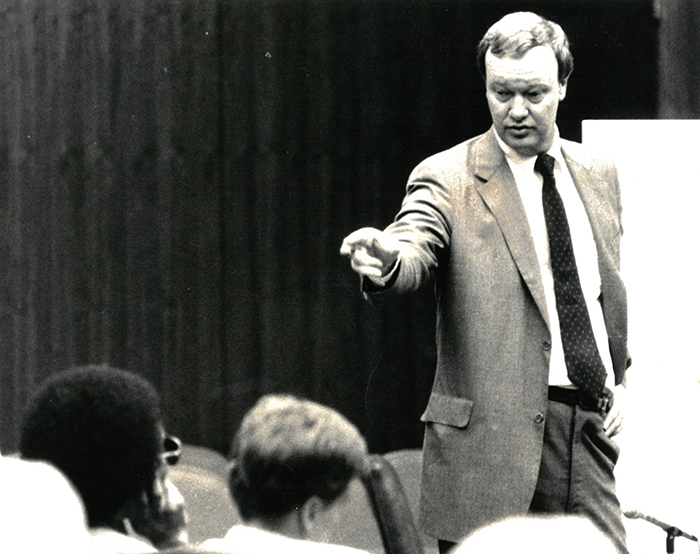It took Bill Smith ’64 more than 40 years to bring one of Georgia’s worst serial killers to justice. Now at the end of the saga, Smith reflects on the case that defined his career.
By Catherine Haynes
Main focuses in video is on the trial
In 1960, when Bill Smith met Louise Chambers during his freshman year at Auburn, he sensed they would spend the rest of their lives together.
He had no idea that the Columbus Stocking Strangler—a serial killer who ravaged Columbus, Ga. from September 1977 to April 1978 and took more than 40 years to bring to justice—would play such a big role in their lives.
When Smith was a freshman, Auburn had a partnership with Tulane University where students could complete three years at Auburn and then attend law school in New Orleans. In 1963, he received a full-ride scholarship, the only one awarded that year. Louise joined him in New Orleans the next year, and the two were married and moved to Quantico, Va. when he joined the FBI.
“I had a three-year commitment with them, and when that was up, I wanted to go back home and practice law. That was what I was trained to do,” said Smith. “And I wanted to come to some Auburn games.”
They moved back to Columbus in 1970, and Smith joined the district attorney’s office in the Chattahoochee Judicial Circuit. He was the chief assistant until a vacancy opened in 1978 and Gov. George Busby appointed him district attorney.
His position was made official on Jan. 4, 1978—only a week after the Georgia Bureau of Investigation (GBI) formed a task force to solve the case of the Columbus Stocking Strangler.
Five murders had occurred within three months. Two more murders and many other break-ins would follow. Without knowing, Smith had stepped into his new role and taken on the biggest case of his life, all in the same week.
The case changed everything, for both Columbus and the Smith family. The city’s gun and lock sales skyrocketed. Smith’s mother, who had come to stay with him for a few nights after a murder occurred down the road from her house, ended up living with him for two years.


Bill Smith at the murder trial of Carlton Gary in 1986.
Smith’s role in the hunt for the Stocking Strangler consisted of authorizing search warrants, discussing suspects and answering questions for the GBI. His job got even harder when 78-year-old Mildred Borom became the Strangler’s sixth victim in February 1978. “It was a very stressful time—a trying time—in Columbus,” recalled Smith. “Everybody just expected another [attack]. We had seven murders in about eight months and all kinds of other break-ins and attempts, and everybody just expected that the next one would occur next month or the next.”
In April 1978, 61-year-old Janet Cofer became the Stocking Strangler’s final victim. As time passed, the citizens of Columbus began working toward healing and justice.
But for Smith, the next five years would be saturated with countless false suspects and leads. The city wouldn’t see a glimpse of closure until 1984, when a stolen .22 caliber Ruger semiautomatic pistol would lead them to Carlton Gary, the suspect they would spend the next 32 years prosecuting.
“It dominated my life. From the time of the commission of the crimes until the time of the execution, it was 40 years.”
Those 40 years consisted of false starts and trials. From having a separate trial to confirm Gary’s mental ability to understand the charges against him, to the defense motioning for a change of venue due to the case’s publicity, the case dragged on. There were countless appeals, and complications with evidence at the GBI Crime Laboratory. But the verdict stood.
“The case was never reversed in those 32 years, [even] with everything that was thrown at it—the kitchen sink. I calculated one time [that] 56 different judges heard it.”
It wasn’t until 2018 that the state of Georgia executed Gary and Smith could finally talk about the case publicly. Since then, one of the ways he has gained closure is through William Rawlings’s book “The Columbus Stocking Strangler,” published in 2022.
“The book is about the case. It’s not about me,” said Smith. “The case doesn’t need any embellishment. It speaks for itself. I’m just so glad it was written.”
Now retired, Judge Smith is free to enjoy one of his favorite pastimes—Auburn football. A tried-and-true fan, he was recognized in 2014 at the San Jose State game for attending 500 Auburn football games.
“I went to my first game at age 6 in 1948 because they played the Georgia-Auburn game in Columbus at that time, and I kept on going. I went to many games before I came to Auburn and just about all of them when I was here. It’s been my hobby and my love.”
Smith says he couldn’t have made it through the Columbus Stocking Strangler case—in addition to the other cases he was a part of through 40 years—without Louise, his family and Auburn football.
“People ask, ‘How’d you do it?’ Well, it was just my job,” he said
Watch Bill Smith share is Auburn experience
Lost and Found
Retired veterinarian Nancy East ’97 found her purpose by finding others.
Still Skiing After All These Years
The Auburn University Water Ski Club celebrated 50 years with a party of the ages.
Going Greek
Three Auburn alumni serve their Greek organizations as national presidents.
Lost and Found
Retired veterinarian Nancy East ’97 found her purpose by finding others.
Still Skiing After All These Years
The Auburn University Water Ski Club celebrated 50 years with a party of the ages.
Going Greek
Three Auburn alumni serve their Greek organizations as national presidents.


